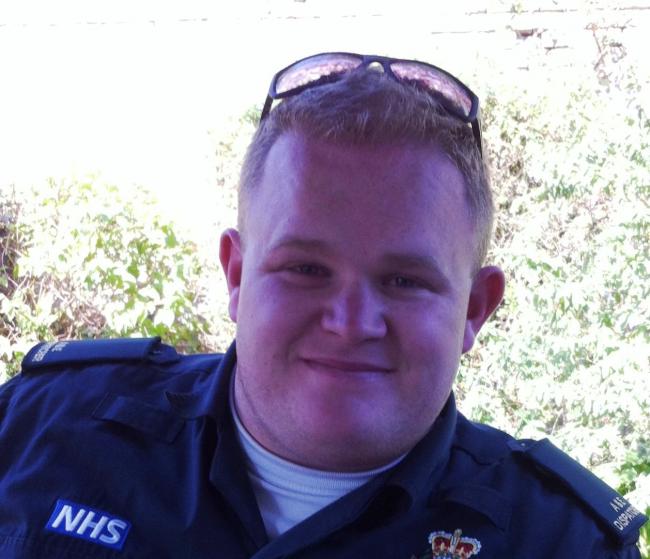A STUDENT paramedic has told of the moment he was attacked out of the blue by the man he was trying to help.
It comes as a new campaign by the South Western Ambulance Service aims to stamp out abuse of paramedics and other ambulance staff.
Over the past year, the trust’s staff have been subjected to violence or aggression on an least 1,049 occasions. However, ambulance bosses have warned that some assaults go unreported and the true figure could be much higher.
Ben Murley has been attacked twice on the job. The first came a year into his training as a student paramedic, studying part-time with the University of the West of England.
The 28-year-old Wiltshire man and his colleague knew the man might be violent, so they kept their distance. But it didn’t stop the man from punching the pair and spitting at them. The case later went to court.
Ben said: “Then last week a colleague and I got spat on by a mental health patient. He got us both in the eye.
“It was totally out of the blue.”

Dad-of-two Ben Murley began training to be a paramedic three years ago. Picture: SWAST
The ambulance crew had been called to reports of an abandoned car. A member of the public said the driver was unwell.
When they arrived, they found him on the top of a piece of agricultural equipment.
After talking him down, Ben and his colleague were able to get their patient into the back of an ambulance.
“All of sudden, as we were putting the monitoring equipment he spat at us in the eyes. We had no idea why,” said Ben.
“Your immediate thought is that you don’t want to carry on dealing with this person. But in our role you have to. Because of the nature of our job, we have to carry on treating them regardless.”
There were few warning signs of what was to come: “This guy was so calm. Then, all of a sudden, ‘bang’.”
All ambulance workers are given a Hepatitis B injection, but being spat on still carries a risk. Ben said: “From a personal point of view I would rather someone punched me than spat on me. It’s degrading, it’s dangerous. It can carry all sorts of diseases.”
He added: “It’s completely unacceptable to attack anyone: police, ambulance, fire service. At the end of the day, we’re just people going to work. We’ve got families, young children. We certainly don’t get paid to be spat at.”
Dad-of-two Ben, who used to work in the ambulance control room, urged his colleagues to be aware of their surroundings and ready for the unexpected. But he said violence against ambulance staff remained rare: “99 per cent of people you treat are lovely.”
Ken Wenman, chief executive of South Western Ambulance Service, branded abuse of his staff totally unacceptable: “Like all our emergency services colleagues, our crews and control staff work in extremely difficult circumstances and are often under threat of attack or abuse.
"We will take whatever action is necessary to ensure that our staff are protected and those responsible for such attacks are prosecuted.”
Up to 12 months in prison for those who attack 999 workers
NEW laws strengthening the punishment for those who assault 999 workers come into force this week.
Parliament passed the Assaults on Emergency Service Workers Act in September. It increases the sentences for those convicted of attacking police officers, paramedics, firefighters and NHS staff from six months to a year. Assault on an emergency service worker should be regarded as an aggravating feature in an assault case, the law states.
Wiltshire Police chief constable Kier Pritchard welcomed the changes when the law was passed two months ago.“I hope the act will serve as a stronger deterrent, which should lead to a significant reduction in the level of assaults on my staff," he said.
“As a force we are now working on introducing additional measures to ensure that our officers have increased protection and are adequately supported when they become victims themselves.”
Last year, Wiltshire Police recorded 103 assaults on its officers, up from 55 the previous year.
Police and crime commissioner Angus Macpherson said: “As with any job there are highs and lows, but being injured and abused on duty should not be part and parcel of working for the police.
"It’s paramount the law protects our officers, staff and volunteers whilst they’re protecting us."






Comments: Our rules
We want our comments to be a lively and valuable part of our community - a place where readers can debate and engage with the most important local issues. The ability to comment on our stories is a privilege, not a right, however, and that privilege may be withdrawn if it is abused or misused.
Please report any comments that break our rules.
Read the rules hereComments are closed on this article